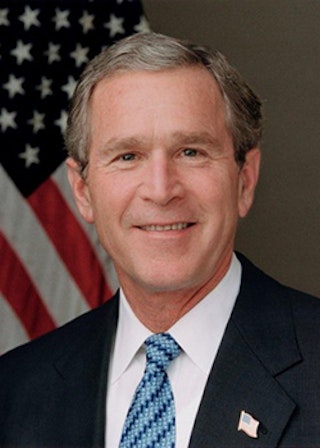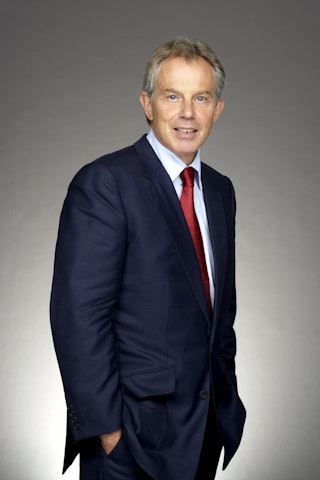Nativism, Protectionism, and Isolationism Are Not the Way Forward
President Bush and Prime Minister Blair discuss how nativism, protectionism, and isolationism can impede our capacity to prosper — and ultimately impact our freedom.
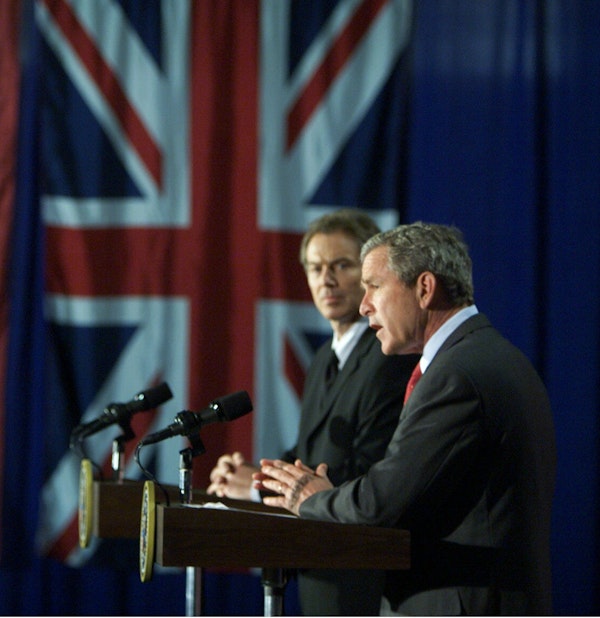 President George W. Bush appears with British Prime Minister Tony Blair at a press conference at Crawford High School in Crawford, Texas on April 6, 2002. (Paul Morse/White House)
President George W. Bush appears with British Prime Minister Tony Blair at a press conference at Crawford High School in Crawford, Texas on April 6, 2002. (Paul Morse/White House)
In mid-July, President George W. Bush and Prime Minister Tony Blair spoke to The Catalyst before the graduation ceremony of the 2016 class of the Presidential Leadership Scholars program at Little Rock Central High School. The two leaders spoke with Catalyst editor William McKenzie in a teacher’s lounge at the historic high school, where President Dwight Eisenhower sent federal troops in September 1957 to guarantee that African-American students could attend Central High. The setting provided a striking backdrop for a discussion of what freedom means today. Later that day, they joined President Bill Clinton and surviving members of the Little Rock Nine for the graduation ceremony.
Nativism, isolationism, and protectionism are at play in both the United States and United Kingdom. What impact will those forces have on the capacity of individuals in each country to maximize their freedom?
Bush: First of all, protectionism is going to be damaging to their respective economies. Individuals will have a harder time achieving their dreams if the economy is damaged.
Secondly, isolationism will make individuals less secure rather than more secure. If you live in a country that espouses freedom, and think you can isolate yourself from a violent extremist group of murderers and let other people handle it, you’re more likely to get attacked. In other words, your individual security will be diminished.
Nativism, or fear of foreigners, affects your soul. I don’t think you can prosper if you’re fearful of somebody else.
— President Bush
And nativism, or fear of foreigners, affects your soul. I don’t think you can prosper if you’re fearful of somebody else. To me, that is this nativism element in America today. Tony can speak better about England, but definitely in Europe it creates this kind of divided, fearful societies.
All three of these forces diminish the individual’s capacity to succeed.
Blair: I agree very strongly with that. The elements that are pushing protectionism, isolationism, and nativism span the whole political spectrum. They’re a reaction to the driving force that is globalization.
People often think that globalization is created by governments. Really, it’s driven by people and technology and the way the world’s changing and coming together. If you react against it, you make yourself fearful but you also make yourself less prepared for the challenges of globalization and less capable of accessing the opportunities.
Bush: Good point. Make sure you’re recording when I say “good point.” (Laughter)
Blair: Yes, and I want that underlined. (Laughter)
 Prime Minister Tony Blair and President George W. Bush at Little Rock Central High School, July 14, 2016. (Grant Miller/George W. Bush Presidential Center)
Prime Minister Tony Blair and President George W. Bush at Little Rock Central High School, July 14, 2016. (Grant Miller/George W. Bush Presidential Center)
If you isolate yourself from the rest of the world, which is going to move closer and closer together, you’re less able to represent and fulfill your interests or potential. For a country to adopt these positions, you send a hostile message to the outside world. You are less able to build the alliances that – certainly for a country our size – you need in order to build influence and to protect your values and interests. Isolating yourself operates in a really contrary way to the proper national interests.
What you realize in today’s politics, but I guess this has always been so, is that playing on the immigration issue is a very fast route to a populism that is often destructive but I’m afraid has its appeal. That is why you’ve got to have a very strong political stand that offers a different vision and allows people to believe that they can get prepared for all these changes in the world. They actually can get excited about them if they have policies that make the most of what I would call an open-minded, creative, and tolerant view of the world.
If you isolate yourself from the rest of the world, which is going to move closer and closer together, you’re less able to represent and fulfill your interests or potential. For a country to adopt these positions, you send a hostile message to the outside world.
— Prime Minister Blair
Following up on this, both of our countries have large, diverse populations. How do we make pluralism work within our own borders?
Bush: In our case, it is adherence to a document that has bound us forever, which is the Constitution. The Constitution provides all kinds of protections for individuals that may not be part of the majority.
Of course, in our country the majority is shifting dramatically. Those people who were in the majority are now becoming a minority. They definitely need the Constitution, just like the newly arrived.
Common purpose has got to be the goal. There’s an angry world now. It’s hard to find common purpose when there’s a lot of anger and distrust. You need leadership to elevate the discourse. I’m confident only because these things go in cycles, but we’re in a rough cycle right now.
Blair: I would agree with that, for sure. We are in a rough cycle. We have to study this a lot now in Europe, where we are very diverse populations and where there are a lot of tensions as a result of that diversity.
Bush: There sure are.
Blair: America is an example of where you’ve really managed to bring very diverse communities together, although you’ve got to work at it the whole time, as you know. It only works where there is a space for diversity, and then there is a common space which everyone has to subscribe to because those are the essential values of the country.
In our case, everyone’s got to accept some basic principles: the rule of law, democracy, the absence of discrimination against women, and so on — the basic freedoms that we hold dear. What is a challenge in the European situation, counting Britain as a part of Europe for these purposes, is that parts of the community will say “No, actually our culture demands that we address these issues differently,” or “We have our own concept of the rule of law or our own concept of how freedom should operate.”
That is when you cross the line. You’ve got to be very clear that people are free to practice their own faith, that culture of diversity actually is a strength. But you have to have a common acceptance of a common space. Otherwise, you start to disrupt the proper functioning of your democracy. You also create a lot of tension within your community.
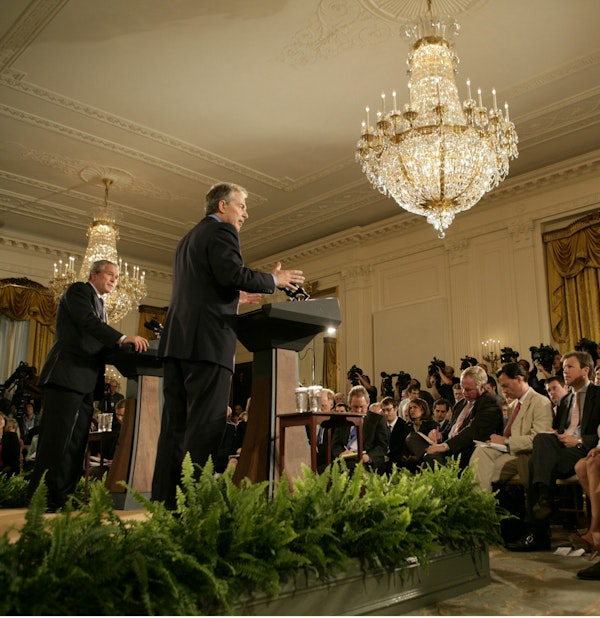 President George W. Bush and British Prime Minister Tony Blair participate in a joint news conference, May 25, 2006 in the White House. The two leaders voiced their support for the newly elected unity government in Iraq. (Eric Draper/White House)
President George W. Bush and British Prime Minister Tony Blair participate in a joint news conference, May 25, 2006 in the White House. The two leaders voiced their support for the newly elected unity government in Iraq. (Eric Draper/White House)
How should leaders in our respective countries take on the challenges that are presented by religious conflict and religious extremism?
Bush: One way is to say there are some universal values that transcend individual sects, such as the universal right for people to be free, or the universal right for women to live in a culture that respects them. Those are universal thoughts. These aren’t western thoughts.
When I was President, people would say we’re trying to impose our values. I always felt like that was kind of an excuse for isolationism. The values that I thought we were proposing transcended American and British values. They’re universal rights.
The idea of a child growing up in a society where it’s peaceful is a universal thought. The ability for people to express themselves in a public square, that’s not a religious thought. That’s a thought that speaks to the humanity and the importance of every individual.
The ability for people to express themselves in a public square, that’s not a religious thought. That’s a thought that speaks to the humanity and the importance of every individual.
— President Bush
Blair: In a world that’s coming together, a respectful view towards those of different faith and religion is essential. Our societies only work today through acceptance of pluralism.
There’s the Islamist extremism challenge, which is huge, but there are allies within Islam who can help us take it on and defeat it. There are extremist groups in other religions as well. But the only way of confronting that ultimately is around a different idea, which is to say you are entitled to your faith but you are not entitled to impose it on other people or create a situation which, because you have that faith, you’re entitled to breach those basic values of humanity.
Bush: One of the things that I used to say, and sometimes people didn’t like this, is that I don’t think they’re religious people who murder the innocent. I don’t think that’s true religion. That provides an excuse for people. I’m sure there are some naive people that fall for murder in the name of God, but that’s not religion.
Some of the conflicts you talk about are conflicts between right and wrong, not between, you know, Episcopalians and Muslims. And I’m pretty confident in telling you that, in the Muslim world, the idea of murdering the innocent is not the majority opinion. One reason why we were successful in parts of Iraq that had been taken over by al-Qaeda is that the local people were sick and tired of dealing with thugs who, in the name of religion, were raping their daughters and murdering their husbands.
It’s not religious conflict, as far as I’m concerned. Religion obviously plays a role. And it’s easy to stir up passions based upon religion. It’s happening here in our country, for example, [with talk about] a ban on Muslims. But I view this issue in a different light.
Would you see it as more of a thirst for political power?
Bush: Yes. It’s a power struggle. I remember I said the word “crusade” one time and the whole Muslim world jumped all over it, particularly those who were looking for an excuse to be anti-American. They said it was a religious war. I was the last guy to be thinking about religious war. I was thinking about, and this kind of irritated people, good versus evil.
Good people do not murder the innocent; it’s as simple as that. You can look at all these societies where there are these power hungry people who murder. I would try to remind people that this is an ideological conflict and we have seen them before and have faced off against people who murder the innocent to advance their ideology — Adolf Hitler, for example.
Blair: You’ve got to distinguish between true religion that is, in all of the great faiths, about compassion, treating others as you would wish to be treated yourself, and belief in God as a universal and compassionate spirit. You distinguish between that and the abusive religions, those that become abused by people in order to create this ideology.
Bush: I agree.
Blair: The ideology itself is a totalitarian ideology. Even though it’s got a religious covering to it, it’s very much the same as the totalitarian political, secular ideologies of the 20th century. You’re got to believe this, and if you don’t believe this, we’re entitled to kill you. And, by the way, we’re entitled to kill you anyway.
That is what we are fighting, and there is good news and bad news. The bad news is the challenge is a global struggle. This type of ideology is being exported around the world. The good news is the vast majority of Muslims don’t want this to be the case.
I spent a lot of time with my foundation studying this and how it grew up. It’s developed probably in the last 60, 70, 80 years, not going back centuries. Like all these totalitarian ideologies, it will be a very long, hard fight. But it will be a fight that’s ultimately won.
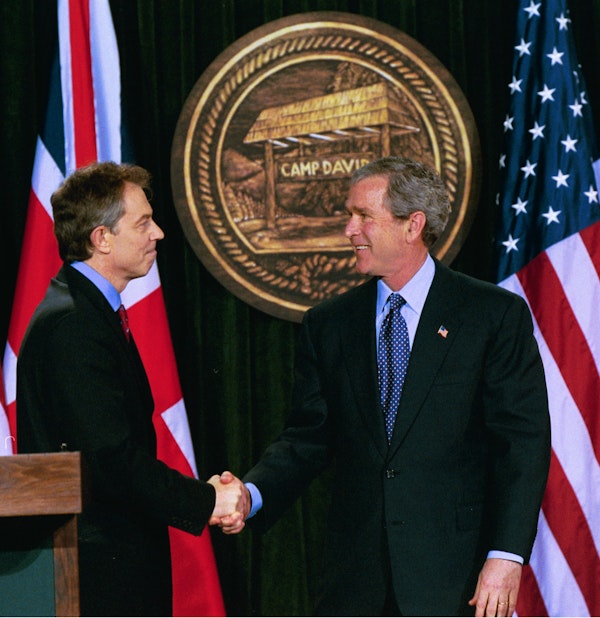 President George W. Bush and British Prime Minister Tony Blair shake hands after they conclude a joint news conference at the Camp David, March 27, 2003. (Paul Morse/White House)
President George W. Bush and British Prime Minister Tony Blair shake hands after they conclude a joint news conference at the Camp David, March 27, 2003. (Paul Morse/White House)
How do leaders win over those who don’t like the destruction they see but aren’t necessarily enamored with the West either?
Blair: This is where there’s a big challenge on education, particularly of young people. A lot of these countries have very young populations. Their education is very narrow. And the values that we are representing are not, as the President just said, western values; they’re universal values of the human spirit. If you give people the chance to choose, by the way, they will always choose that. Why wouldn’t you?
In the end, the idea that if you work hard, succeed by your own merit in rule- based economies, and live together in harmony with people of a different faith, most people would prefer to live like this, let’s be clear.
You have to tackle this at the source. The trouble is, there’s a thesis that’s developed in the West that, in my view, is inhibiting us from dealing with this problem. The thesis is that it’s the West’s fault that this problem exists. That undermines our ability to build the right alliances.
Bush: He’s right on that. There’s a defensiveness about it all. We’re imposing our views, and we should not impose our views. This enhances isolationism. It basically says let them figure it out themselves.
These young democracies need help. To me, it’s an obligation of more established democracies to help them. It’s not easy. I tell people all the time that Condi Rice’s relatives were enslaved for a hundred years in our democracy. It’s an evolutionary process.
The problem with globalization is that there needs to be instant gratification now. But democracy isn’t like that. Democracy is a way of life that requires institutional development and a good education system and it takes time. In an impatient world, people say, well, it’s just too hard, let’s forget it. That’s a major mistake.
So, 75 years after FDR’s Four Freedoms address, what do you think the quest for freedom means today?
Bush: For one thing, it means securing our own respective countries. The only way to win an ideological conflict is to promote an ideology that marginalizes the ideology that these haters adhere to. People have to be shown a better way of life. To me, it’s the ultimate source of national security.
Blair: We should regard the battle for freedom as ongoing, essential, and even more essential today because we have new centers of power developing and we have this ideology based on an abusive religion. And we have many hundreds of millions of people who don’t live in societies with freedom.
As new powers emerge, and as the world changes, it’s going to become all the more important for America to stand strong in defense of those values – and for those of us who share these basic values and who implement them in our countries to stand alongside with them.
Bush: What will be interesting is for historians to analyze the Arab Spring. What caused it? Was it perhaps the liberation of a group of people from a thug? And a constitution that enabled women, for example, to serve in Parliament?
There had to be an example somewhere along the way that said to others, we want the same rights. We want to live in the same kind of open or more open society. We’re tired of the thugs who’ve been running our lives.
[Former Egyptian President Hosni] Mubarak wasn’t a thug but he certainly wasn’t open for political change. The same with [former President Zine El Abidine] Ben Ali in Tunisia. It will be an interesting question for historians to ask: Does freedom beget freedom? There’s a good case to be made that when freedom started to take root in a part of the world where nobody ever thought freedom would exist, it caused others to say I want the same thing.
I happen to believe the Arab Spring is the beginning of a victory for freedom. It’s just going to take a long time to get there. But it confirms what Tony and I believe, and that is deep in everybody’s soul is the desire to be treated with respect and have their voices heard.
People in Tunisia and Egypt didn’t have to go do what they did. They were just sick of it all. It was a popular overthrow.
The Arab Spring is the beginning of a victory for freedom. … it confirms what Tony and I believe, and that is deep in everybody’s soul is the desire to be treated with respect and have their voices heard.
—President Bush
Blair: The thing about the Middle East, which the Arab Spring exemplifies, is the region is in a process of transition.
Bush: Yes.
Blair: And the transition is often agonizing, I’m afraid, and brutal. But it is a necessary transition.
Bush: The United Arab Emirates is quietly transitioning. The UAE is a really interesting place to watch women’s rights develop, to see civil society developing.
Beneath the surface in Saudi Arabia, and you go there a lot more than I do, Tony, I’m told there’s a whole entrepreneurial class of young Saudis educated in England and the United States who are beginning to take control, slowly but surely, and advance a civil society which enables a freer society to develop. It may be a constitutional monarchy at some point, who knows? But change is happening.
Of course, the focus is on the real trouble spots. A real question for U.S. foreign policy in the future is [President Abdel Fattah ] al-Sisi and Egypt. Can Sisi be convinced, upon stabilization, to begin to open up his society because it is a more secular type society?
Blair: I think that’s correct. It’s interesting, for example, that in the last five years when people across the Middle East were asked what country they would most aspire their country to be like it was the UAE. And that was for five years running. That shows you how people think about it.
What happened in the Arab Spring is that two groups came together to overthrow the existing order. Once they were overthrowing the existing order, they were in alliance. Afterwards they disagree.
Those two groups are what I would call an open-minded, more democratic group that is probably the most numerous group, but badly organized, and then you had Islamists who were numerous and well organized.
“The thing about the Middle East, which the Arab Spring exemplifies, is the region is in a process of transition. And the transition is often agonizing, I’m afraid, and brutal. But it is a necessary transition.”
– Prime Minister Blair
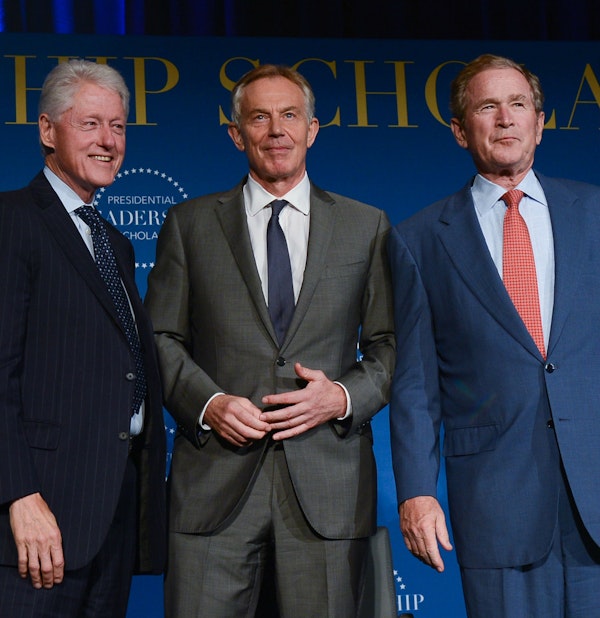 President Bill Clinton, Prime Minister Tony Blair, and President George W. Bush at Little Rock Central High School, July 14, 2016. (Grant Miller/George W. Bush Presidential Center)
President Bill Clinton, Prime Minister Tony Blair, and President George W. Bush at Little Rock Central High School, July 14, 2016. (Grant Miller/George W. Bush Presidential Center)
Bush: In Egypt, by the way, one group was allowed to organize and the other wasn’t. The Muslim Brotherhood was allowed to organize and so Mubarak used to come and say, we better not have an election, the Muslim Brotherhood will win. When the first election came around, they were the only ones who knew how to campaign.
Blair: In the end, you’ve got to go through this. I know many people in Egypt who voted for the Muslim Brotherhood, but then experienced them and thought, whoa, this is not a good idea.
Bush: Exactly.
Blair: We’ve got to stand with those countries during this process of transition. It’s difficult having to build institutions. They’re having to overcome a whole legacy of bad politics mixing with this abusive religion.
Bush: And corruption.
Blair: Corruption is a huge problem. I used to meet people in Egypt after the revolution and I would say to them, well, what’s your economic policy going to be? And they would say, we’re going to get out in the street. And I would say, that’s not economic policy. That’s just a protest. How are you going to govern?
This is difficult. It will take time for these countries to evolve. But they can and they will and Egypt’s a classic case.
Bush: Back to your question about how do Great Britain and the United States deal in a world where we’re not liked. We are liked. You put a poll out there and ask, if you could move to London or New York, would you move? And it would be overwhelmingly yes.
Blair: We often completely misread this.
Bush: I think so.
Blair: It’s a very good test of a country. Are people trying to get into it or out of it?
The Catalyst believes that ideas matter. We aim to stimulate debate on the most important issues of the day, featuring a range of arguments that are constructive, high-minded, and share our core values of freedom, opportunity, accountability, and compassion. To that end, we seek out ideas that may challenge us, and the authors’ views presented here are their own; The Catalyst does not endorse any particular policy, politician, or party.

